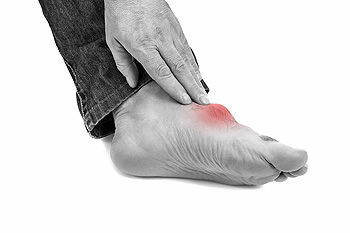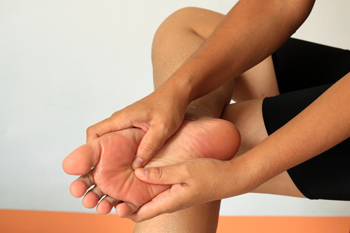Items filtered by date: May 2021
Treat Your Feet to Diabetic Shoes
Symptoms of Diabetic Neuropathy
 Diabetic neuropathy is a common complication of diabetes that causes nerve damage in the hands and feet. Neuropathy tends to develop slowly, sometimes over several decades, so people with diabetes are urged to closely monitor their foot health. The symptoms of diabetic neuropathy include a “pins and needles” sensation in the feet, sensitivity to touch or a loss of touch, pain, numbness, tingling, burning, difficulties with coordination while walking, and muscle weakness. Diabetic neuropathy can be dangerous and lead to serious complications, as the loss of sensation that it causes in the feet can make foot wounds more likely to form. These wounds tend to heal poorly and may become infected. If you have diabetes, a podiatrist can help you maintain the health of your feet.
Diabetic neuropathy is a common complication of diabetes that causes nerve damage in the hands and feet. Neuropathy tends to develop slowly, sometimes over several decades, so people with diabetes are urged to closely monitor their foot health. The symptoms of diabetic neuropathy include a “pins and needles” sensation in the feet, sensitivity to touch or a loss of touch, pain, numbness, tingling, burning, difficulties with coordination while walking, and muscle weakness. Diabetic neuropathy can be dangerous and lead to serious complications, as the loss of sensation that it causes in the feet can make foot wounds more likely to form. These wounds tend to heal poorly and may become infected. If you have diabetes, a podiatrist can help you maintain the health of your feet.
Neuropathy
Neuropathy can be a potentially serious condition, especially if it is left undiagnosed. If you have any concerns that you may be experiencing nerve loss in your feet, consult with Gary J. Kaiserman, DPM from Achilles Footcare Center. Our doctor will assess your condition and provide you with quality foot and ankle treatment for neuropathy.
What Is Neuropathy?
Neuropathy is a condition that leads to damage to the nerves in the body. Peripheral neuropathy, or neuropathy that affects your peripheral nervous system, usually occurs in the feet. Neuropathy can be triggered by a number of different causes. Such causes include diabetes, infections, cancers, disorders, and toxic substances.
Symptoms of Neuropathy Include:
- Numbness
- Sensation loss
- Prickling and tingling sensations
- Throbbing, freezing, burning pains
- Muscle weakness
Those with diabetes are at serious risk due to being unable to feel an ulcer on their feet. Diabetics usually also suffer from poor blood circulation. This can lead to the wound not healing, infections occurring, and the limb may have to be amputated.
Treatment
To treat neuropathy in the foot, podiatrists will first diagnose the cause of the neuropathy. Figuring out the underlying cause of the neuropathy will allow the podiatrist to prescribe the best treatment, whether it be caused by diabetes, toxic substance exposure, infection, etc. If the nerve has not died, then it’s possible that sensation may be able to return to the foot.
Pain medication may be issued for pain. Electrical nerve stimulation can be used to stimulate nerves. If the neuropathy is caused from pressure on the nerves, then surgery may be necessary.
If you have any questions, please feel free to contact our offices located in Forest Lane and West Kiest Boulevard Dallas, TX . We offer the newest diagnostic and treatment technologies for all your foot care needs.
What to Do if You Have Morton's Neuroma
Morton’s neuroma is a condition in which the nerve tissue located in the ball of the foot, between the toes, becomes inflamed. This causes symptoms such as sharp pain in the bottom of the foot, tingling, burning, numbness, or the sensation that you are walking on a pebble or that something is stuck in the ball of your foot. Morton’s neuroma can often fully resolve with conservative treatments such as resting and icing the foot, wearing wide and comfortable shoes, wearing orthotic inserts, and taking over the counter medications to reduce pain. Your podiatrist can also relieve Morton’s neuroma pain by injecting cortisone directly into the foot. In rare cases, symptoms may be persistent and could require surgical intervention. Consult with a podiatrist to find out which treatment method would be best for you.
Morton’s neuroma is a very uncomfortable condition to live with. If you think you have Morton’s neuroma, contact Gary J. Kaiserman, DPM of Achilles Footcare Center. Our doctor will attend to all of your foot care needs and answer any of your related questions.
Morton’s Neuroma
Morton's neuroma is a painful foot condition that commonly affects the areas between the second and third or third and fourth toe, although other areas of the foot are also susceptible. Morton’s neuroma is caused by an inflamed nerve in the foot that is being squeezed and aggravated by surrounding bones.
What Increases the Chances of Having Morton’s Neuroma?
- Ill-fitting high heels or shoes that add pressure to the toe or foot
- Jogging, running or any sport that involves constant impact to the foot
- Flat feet, bunions, and any other foot deformities
Morton’s neuroma is a very treatable condition. Orthotics and shoe inserts can often be used to alleviate the pain on the forefront of the feet. In more severe cases, corticosteroids can also be prescribed. In order to figure out the best treatment for your neuroma, it’s recommended to seek the care of a podiatrist who can diagnose your condition and provide different treatment options.
If you have any questions, please feel free to contact our offices located in Forest Lane and West Kiest Boulevard Dallas, TX . We offer the newest diagnostic and treatment technologies for all your foot care needs.
Causes and Possible Remedies for Gout
 The most common symptom of a foot condition that is referred to as gout, is intense pain in the joints of the big toe. It is considered to be a form of arthritis, and can occur from elevated uric acid levels in the bloodstream. It can develop for a variety of reasons, including genetic factors, taking specific medication, or from eating foods that have high levels of purines. These can consist of red meat, shellfish, and drinks that are made with large amounts of sugar. It is beneficial to limit the types of foods that can cause gout, and specific medication may be prescribed that can bring mild relief. If you have been afflicted with gout, it is strongly suggested that you are under the care of a podiatrist who can offer you correct treatment options.
The most common symptom of a foot condition that is referred to as gout, is intense pain in the joints of the big toe. It is considered to be a form of arthritis, and can occur from elevated uric acid levels in the bloodstream. It can develop for a variety of reasons, including genetic factors, taking specific medication, or from eating foods that have high levels of purines. These can consist of red meat, shellfish, and drinks that are made with large amounts of sugar. It is beneficial to limit the types of foods that can cause gout, and specific medication may be prescribed that can bring mild relief. If you have been afflicted with gout, it is strongly suggested that you are under the care of a podiatrist who can offer you correct treatment options.
Gout is a foot condition that requires certain treatment and care. If you are seeking treatment, contact Gary J. Kaiserman, DPM from Achilles Footcare Center. Our doctor will treat your foot and ankle needs.
What Is Gout?
Gout is a type of arthritis caused by a buildup of uric acid in the bloodstream. It often develops in the foot, especially the big toe area, although it can manifest in other parts of the body as well. Gout can make walking and standing very painful and is especially common in diabetics and the obese.
People typically get gout because of a poor diet. Genetic predisposition is also a factor. The children of parents who have had gout frequently have a chance of developing it themselves.
Gout can easily be identified by redness and inflammation of the big toe and the surrounding areas of the foot. Other symptoms include extreme fatigue, joint pain, and running high fevers. Sometimes corticosteroid drugs can be prescribed to treat gout, but the best way to combat this disease is to get more exercise and eat a better diet.
If you have any questions please feel free to contact our offices located in Forest Lane and West Kiest Boulevard Dallas, TX . We offer the newest diagnostic and treatment technologies for all your foot and ankle needs.
What Causes Peroneal Tendonitis?
 Peroneal tendonitis is a condition in which the peroneal tendons, which run down the lower leg bone and behind the bony bump on the outside of the ankle, become inflamed. This is common among people who play sports that involve repetitive ankle movements and may occur due to overuse, a sudden increase in training, using improper training techniques, or wearing unsupportive footwear. People who have high arches or muscle imbalances are more likely to develop peroneal tendonitis. The symptoms of this condition include pain at the back of the ankle that worsens during physical activity, swelling at the back of the ankle, and ankle instability. If you have pain in your ankles, please consult with a podiatrist.
Peroneal tendonitis is a condition in which the peroneal tendons, which run down the lower leg bone and behind the bony bump on the outside of the ankle, become inflamed. This is common among people who play sports that involve repetitive ankle movements and may occur due to overuse, a sudden increase in training, using improper training techniques, or wearing unsupportive footwear. People who have high arches or muscle imbalances are more likely to develop peroneal tendonitis. The symptoms of this condition include pain at the back of the ankle that worsens during physical activity, swelling at the back of the ankle, and ankle instability. If you have pain in your ankles, please consult with a podiatrist.
Ankle pain can be caused by a number of problems and may be potentially serious. If you have ankle pain, consult with Gary J. Kaiserman, DPM from Achilles Footcare Center. Our doctor will assess your condition and provide you with quality foot and ankle treatment.
Ankle pain is any condition that causes pain in the ankle. Due to the fact that the ankle consists of tendons, muscles, bones, and ligaments, ankle pain can come from a number of different conditions.
Causes
The most common causes of ankle pain include:
- Types of arthritis (rheumatoid, osteoarthritis, and gout)
- Ankle sprains
- Broken ankles
- Achilles tendinitis
- Achilles tendon rupture
- Stress fractures
- Bursitis
- Tarsal tunnel syndrome
- Plantar fasciitis
Symptoms
Symptoms of ankle injury vary based upon the condition. Pain may include general pain and discomfort, swelling, aching, redness, bruising, burning or stabbing sensations, and/or loss of sensation.
Diagnosis
Due to the wide variety of potential causes of ankle pain, podiatrists will utilize a number of different methods to properly diagnose ankle pain. This can include asking for personal and family medical histories and of any recent injuries. Further diagnosis may include sensation tests, a physical examination, and potentially x-rays or other imaging tests.
Treatment
Just as the range of causes varies widely, so do treatments. Some more common treatments are rest, ice packs, keeping pressure off the foot, orthotics and braces, medication for inflammation and pain, and surgery.
If you have any questions, please feel free to contact our offices located in Forest Lane and West Kiest Boulevard Dallas, TX . We offer the newest diagnostic and treatment technologies for all your foot care needs.


